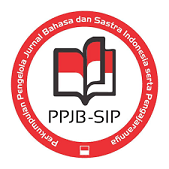PEMBELAJARAN MEMPRODUKSI TEKS CERITA PENDEK BERDASARKAN KURIKULUM 2013 DI KELAS XI IPB SMA NEGERI 1 SEMARAPURA
DOI:
https://doi.org/10.23887/jjpbs.v7i2.15098Abstract
Penelitian ini bertujuan mendeskripsikan perencanaan, pelaksanaan, dan evaluasi pembelajaran memproduksi teks cerita pendek berdasarkan kurikulum 2013 di kelas XI IPB SMA Negeri 1 Semarapura.Penelitian ini menggunakan rancangan deskriptif kualitatif. Subjek penelitian ini adalah guru bahasa Indonesia yang mengajar di kelas XI IPB dan siswa kelas XI IPB SMA Negeri 1 Semarapura. Objek penelitian ini adalah pembelajaran memproduksi teks cerita pendek. Metode pengumpulan data yang digunakan adalah dokumentasi, observasi, dan wawancara. Hasil penelitian ini menunjukkan, pertama, perencanaan pembelajaran memproduksi teks cerita pendek berdasarkan kurikulum 2013 di kelas XI IPBSMA Negeri 1 Semarapura sudah sesuai dengan komponen dan sistematika penyusunan RPP kurikulum 2013. Kedua, pelaksanaan pembelajaran memproduksi teks cerita pendek berdasarkan kurikulum 2013 di kelas XI IPB SMA Negeri 1 Semarapura sudah menggunakan pendekatan saintifik. Penerapan pendekatan saintifik dalam pembelajaran sudah melibatkan lima keterampilan, yaitu mengamati, menanya, mencoba, menalar, dan mengomunikasikan. Ketiga, evaluasi pembelajaran memproduksi teks cerita pendek berdasarkan kurikulum 2013 di kelas XI IPB SMA Negeri 1 Semarapura sudah sesuai dengan penilaian autentik. Dalam penilaian autentik evaluasi dilakukan melalui 3 jenis penilaian, yaitu penilaian sikap, keterampilan, dan pengetahuan.Kata Kunci : pembelajaran, memproduksi, teks cerita pendek, kurikulum 2013
This study aimed to describe the planning, implementasion and evalution of learning to produce story text based on the curriculum of 2013 in class XII IPB SMA Negeri 1 Semarapura. this research used descritive qualitative design. the subject of study were indonesia teacher who teach in class XII IPB and students of class XI IPB SMA N 1 Semarapura . the object of study is learning to produce short story. The data collection method used documentasion , observation and interview. The result of study show that . first the lesson plan to produce short story text based of curriculum of 2013 in the class XI IPB SMA Negeri 1 Semarapura. In accordance with the component and sytem of the component and sytem of the preparation of RPP Curriculum 2013 second the implementasion of learning to produce short story text based on the 2013 curriculum 2013 curriculum in the class XI IPB SMA Negeri 1 Semarapura has used a scientific approach. the application of the scientific approach to learning involve five skill : observation, asking, traying reasoning and communicating .third the evalution od learning to produce short story text based of curriculum 2013 in class XI IPB SMA Negeri 1 Semarapura. In accordance with the authentic assesment . in the assesment evalution is done throught 3 types of assesment namely assessment of attitude, skill, dan knowledge.
keyword : producing, short story text and curriculum 2013
Published
2018-07-26
Issue
Section
Articles
License
Authors who publish with the Jurnal Pendidikan Bahasa dan Sastra Indonesia Undiksha agree to the following terms:- Authors retain copyright and grant the journal the right of first publication with the work simultaneously licensed under a Creative Commons Attribution License (CC BY-SA 4.0) that allows others to share the work with an acknowledgment of the work's authorship and initial publication in this journal
- Authors are able to enter into separate, additional contractual arrangements for the non-exclusive distribution of the journal's published version of the work (e.g., post it to an institutional repository or publish it in a book), with an acknowledgment of its initial publication in this journal.
- Authors are permitted and encouraged to post their work online (e.g., in institutional repositories or on their website) prior to and during the submission process, as it can lead to productive exchanges, as well as earlier and greater citation of published work. (See The Effect of Open Access)







